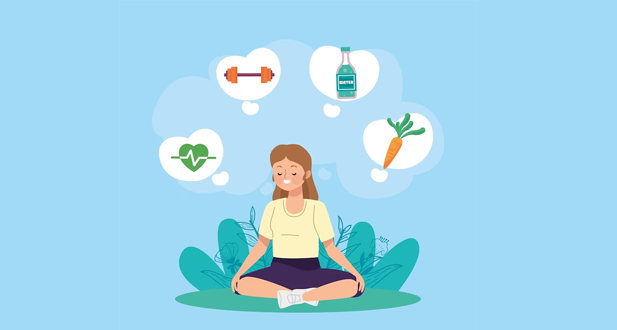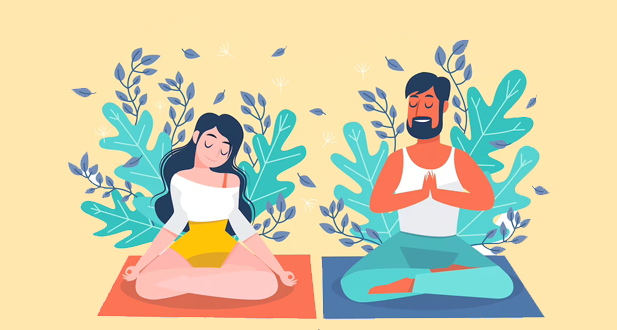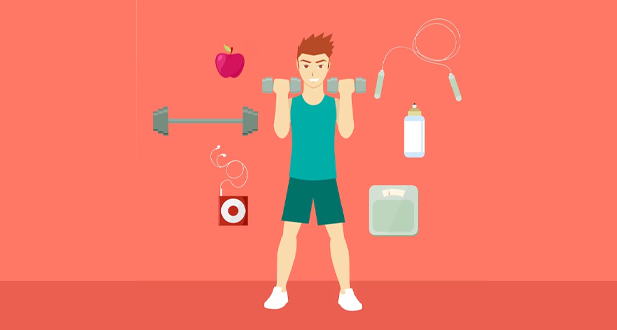
Why is wellness essential?
What is Wellness?
One must practice healthy behaviours regularly to achieve improved physical and mental health results and thrive rather than survive.
For one to fully comprehend the importance of wellness, one must first understand how wellness and health are related. Health is “a condition of total physical, mental, and social well-being and not only the absence of disease or disability,” as the World Health Organization (WHO) states.
A few significant facets of your lifestyle are considered general wellness elements. These consist of awareness, exercise, good nutrition, and social connection. Your physical and mental health are affected by each. Hence, you will be well on your way to reducing stress, having fulfilling social connections, and achieving optimum wellness by making straightforward and healthy selections every day.
You don’t need to run a marathon or adhere to a rigid diet to incorporate wellness into your daily life; start with little adjustments in each area and take it one day at a time.
- Social Interaction Maintaining relationships with friends and family might help you feel better physically and mentally. Call someone you’ve been thinking about for 10 minutes today. This is an excellent way to stay in touch and catch up with the individuals who are most important to you.
- Exercising for 20 or 30 minutes can boost your mood and overall well-being. Still, trying to figure out where to begin? Use the stairs, instead of using the elevator, or on your lunch break, go for a quick walk.
- The nutrition, you may become a healthier version of yourself by filling your plate with good ingredients. To have on hand as a snack, think about bringing an apple and other raw vegetables in your luggage. You might be able to avoid fast food joints or vending machines as a result.
- Sleep, think about your sleeping habits. Avoiding coffee after 12 o’clock, engaging in peaceful activities before bed, and waking up at the same time each day are all easy methods to start your route to healthy sleep.
- Mindfulness did you know that mindfulness training alters the brain and is beneficial for the body, mind, and focus? Take a moment to explore your thinking and how you are feeling. Start practicing mindfulness today to start being more aware of your thoughts and how you respond to stressful situations.
Why is it important?
- Personal Health: The epidemic has highlighted how both chronic and acute stress are physically stored in our bodies. Increasing fatigue, trouble sleeping, tension headaches, and body pains are typical indicators of persistent COVID-19-related anxiety or post-traumatic adjustment stress. We are all different. Thus we could have bodily sensations distinct from those of the people we know.
- Physical Health and Self-Care: Consider novel forms of exercise that you have never attempted before or something you have always wanted to do but hasn’t had the opportunity to do. For example, if you run, consider alternating with short periods of walking. Consider listening to meditation as you walk if you are a walker. If you don’t do either, think about doing some light stretching as you study. Positive and curious discussions on physical wellness with loved ones and friends may provide fresh ideas for self-care plans.
- Spiritual Wellness: About a year ago, spiritual and religious communities started to offer services like preaching, prayer, meditation, and even hospital bedside visits virtually. This was a significant change. Worshipers have been saddened by the loss of sacred spaces and community rituals, especially during holy times like Passover, Easter, and Ramadan, and other times when the community comes together as one.
- Self-care is important for spiritual health: Explore creative ways to connect with spiritual and religious communities. Join informal spirituality/religion discussion groups on Zoom. Talk to spiritual and religious elders for advice and support on how to get through this time. Think about ways we can find a spiritual community that doesn’t involve being in the same place as other people.
- Social Wellness: Some of us may find the need for social distancing confusing and hard to understand, especially if a big part of our self-care has been around other people. People are biologically designed to look for connection, understanding, and approval in relationships. Even though we know it’s important to keep a safe distance and meet virtually with others, our attachment systems have trouble with feeling less close, having to put in more effort, and feeling more disconnected and alone. It can be overwhelming to go from normal to quarantine to normal with masks to normal again to quarantine to who knows.
- Self-care for a healthy social life: Think about if discussing this with our safe allies or in our safe partnerships could be beneficial. The essence of social wellness is having someone to talk to when we feel lost and alone, without comparing or judging. During these conversations, we pause if there is a strong emotional response. This would be a way to show gratitude when we would typically keep talking. At other times, they say hello to classmates and plan times when they don’t use technology.
- Occupational Wellness: Recognizing and gaining access to personal fulfillment and life enrichment at work is what is meant by occupational wellness. This topic of well-being has undergone a considerable redefinition and acceleration during the pandemic in areas relating to our workplaces. Being in healthy, productive spaces is necessary to protect occupational health. In addition, morale and trust erode without the reassurance of collective socially responsible behavior, explicit action, and communication.
- Self-Care for Occupational Wellness: Establish clear boundaries around work-related concerns to stop them from affecting other aspects of your life. For example, consider a different workspace closer to a sunny window. If a tech update is needed for your work, explore if resources exist. Seek clarification on COVID-19 workplace safety measures and state your demands. Most importantly, prioritize your health if you can take time off due to illness.
- Intellectual Wellness: Engaging in innovative and mentally challenging activities, learning, and developing abilities related to advancing and sharing knowledge are all examples of intellectual knowledge. But, a lack of intellectual stimulation can damage the brain’s ability to produce the neurotransmitters that make us happy and eager to learn.
- Self-Care for Intellectual Wellness: Study a subject of interest that you have never had time to study before the pandemic in your (limited) free time. Study with someone who has a different major from you, and you can both “speak it out” with them. Consider the aspects of your future career and area of interest that you would modify. Consider whether academic help is necessary during this pandemic period next.
- Environmental Wellness: Throughout the past six months, accessing enlightening space in our immediate and surrounding contexts has been crucial. For group events, we’ve had to move to the outdoors, which is safer. We frequently spend time inside, minimizing our interaction with others, when we need to socially isolate ourselves. The ability to congregate and interact happily and comfortably with people while working on a topic or activity emphasizes how crucial that space is. Our daily surroundings—the people, places, attitudes, and ideas—define our environmental well-being.
- Self-Care for Environmental Wellness: Stay in touch with your neighborhood’s teachers, mentors, family, and friends. Be willing to discuss how much time and space you require for comfort with the individuals you live with. It’s crucial to fight for your alone time if you want to connect and recharge during the day, especially if you’re more introverted.
- Cultural Wellness: The pandemic has compelled us to urgently assess our collective and individual cultural fitness. Racism and institutional oppression continue to damage many in our community, both those we know and those we do not. For instance, compared to White people, American Indian, African American, and Latino/x people have a three-fold higher hospitalization and mortality risk from COVID-19. In a similar vein, vaccination rates in Black and Latino/x groups are lower than those for cases and fatalities. People from various backgrounds and experiences come together for their education at a crossroads, where 2000+ varied young adults from near and far gather and make contributions to the community’s common culture.
- Cultural Health Through Self-Care: Look for varied viewpoints, details, anecdotes, and experiences. Engage in diverse peer interactions and develop an interest in your culture, family customs, and traditions, all of which, according to research, are beneficial to wellness. This could be a great moment to think about going to campus discussions about culture. A straightforward but important tactic in our quest for wellness in this area is taking the time to consider our own internal biases that we act on based on preconceptions of ethnicity, gender, religion, or sexual orientation.
- Emotional Wellness: Ironically, our stress is aiding in our ability to cope, connect with one another virtually as much as possible, and control the virus’s spread. Even though it’s unpleasant, it can help you become resilient, especially if you handle it correctly. Keeping informed is crucial, but it’s also important to avoid spreading inner or outside fear. We must make time for quiet, screen-free periods where we can focus on the here and now.
- Self-Care for Emotional Wellness: The emotional hardship of the past 18 months proves that we are fallible people with internal struggles. Putting emotional health first may require us to return to the fundamentals. We were getting the proper amount of sleep and food during the day to maintain our energy, and we would slow down if we felt more exhausted than usual. And after going through so much, “stepping back” occasionally to recall that what felt inward is valid and expected.
Benefits of Wellness Programs
Being mindful of your behaviors and making decisions that support a healthier lifestyle is the process of being well. Employee happiness is correlated with a healthier lifestyle. Eight advantages of wellness programs are listed below:
- Emotional recognition of your emotions and managing stress.
- Occupational gratification refers to your sense of worth and appreciation at work.
- Being mindful of your surroundings is part of respecting the environment.
- Physical well-being includes a healthy diet, regular exercise, and seeking care as required.
- Intellectual means keeping an open mind and broadening your horizons.
- Social establishing and joining a network of allies.
- Financial effectively handling your finances.
- Spirituality is the process of discovering meaning and purpose through your own set of ideals.
A holistic health program is necessary since the different areas can interact and influence one another. At the very least, a well-rounded program should promote mental, emotional, physical, and environmental wellness.
Businesses can implement a wellness program in a variety of ways. To ensure that useful ideas are recognized early on, brainstorming and planning are crucial. It would be beneficial to begin modestly and gradually introduce new concepts to your staff. Later, as interest grows, your program might become more extensive. To help you get started, here are a few ideas we came up with:
- Purchase pedometers for each worker.
- Eliminate junk food from the vending machine.
- Provide free health-risk evaluations.
- Provide nutritional information about fast food places and other, healthier eateries that are nearby the office.
- Send out a health bulletin.
- Choose a different speaker to address various health issues.
- Get opinions from the workforce.
Conclusion:
To strengthen our immune systems and ward off illness, we need to lead healthy lifestyles. To protect your body, you must “keep” a strong immune system. like we just discussed, to keep the body immune. Nutrition is the first. We ought to consume a variety of foods and maintain a healthy diet.



